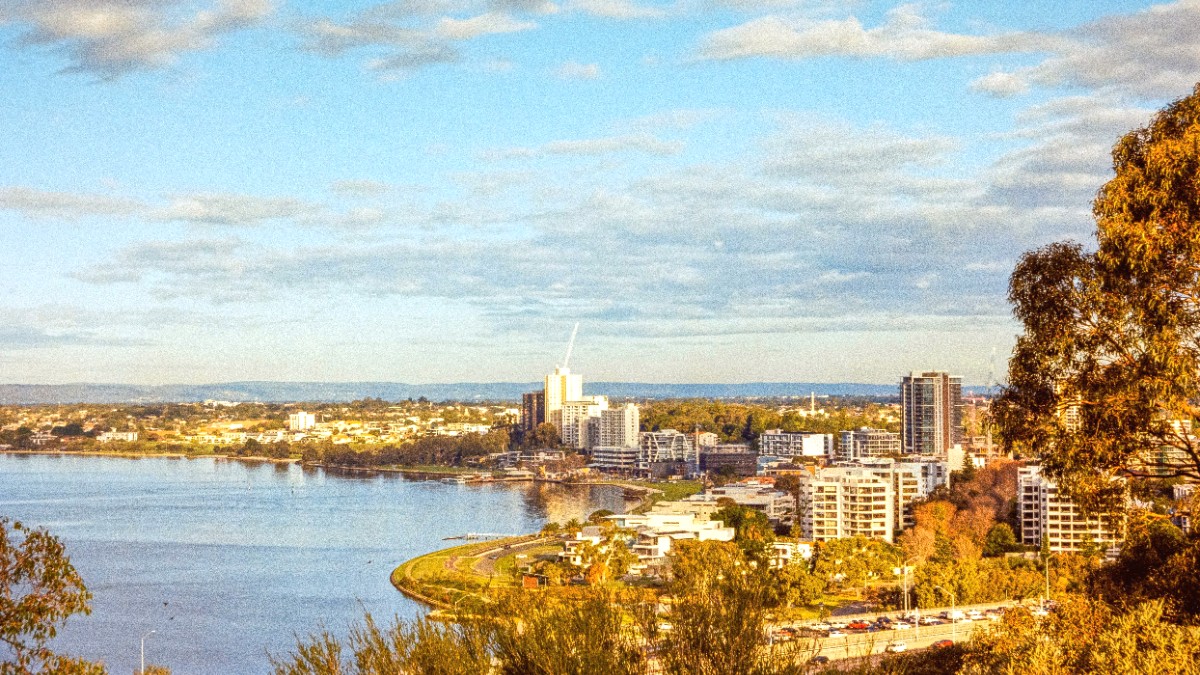
Western Australia, Australia
Summer (December - February) sees average temperatures from 18°C to 32°C (64°F to 90°F). Many days often go over 35°C (95°F). Rainfall is minimal, with consistently clear skies. Humidity stays low. The "Fremantle Doctor," a cooling sea breeze, provides relief on most afternoons, specifically in coastal areas.
Autumn (March - May) has average temperatures from 13°C to 26°C (55°F to 79°F). Days stay warm and sunny. Cooler evenings bring a pleasant crispness. Rainfall remains low to moderate, with occasional showers starting towards late April and May. This season often has stable, agreeable weather.
Winter (June - August) sees average temperatures from 8°C to 19°C (46°F to 66°F). Days are mild. Nights can become cool. This period has the most rainfall, though prolonged heavy downpours are uncommon. Sunshine still breaks through between rain showers.
Spring (September - November) has average temperatures from 11°C to 23°C (52°F to 73°F). This season presents pleasant, warm days. Wildflowers bloom across Western Australia, transforming the landscape into a colorful display, notably from late September through October. Rainfall is generally low.
September - April
Warm, sunny weather ideal for beaches and outdoor activities. Many events, festivals, and outdoor concerts. Long daylight hours. Ocean warm enough for swimming.
Accommodation and flight prices are highest. Popular attractions can have crowds. Mid-summer can bring intense heat.
May - June, August
Mild, comfortable temperatures. Fewer crowds. Lower accommodation and flight prices. Whale watching begins in June.
Increased chance of rain. Some smaller tourist operations may have reduced hours. Ocean cool for swimming.
July - August
Best value for flights and accommodation. Fewest tourists. Lush, green landscapes. Whale watching in full swing. Ideal for indoor cultural offerings.
Coolest and wettest months. Shorter daylight hours. Beaches too cold for swimming.
During summer (December-February), bushfire risk is high in surrounding natural areas and the Perth Hills. Fires can cause smoke haze and road closures. Monitor local alerts from the Department of Fire and Emergency Services (DFES) website. Prolonged periods of extreme heat can occur in summer. During a heatwave, stay hydrated, seek shade, limit strenuous outdoor activity. Utilize air-conditioned indoor spaces.
Perth has a very high UV index, specifically in summer. Sun protection is always needed, regardless of temperature.
Summer (Dec-Feb) and early Autumn (Mar-Apr) for warm ocean and sun.
Spring (Sep-Nov), especially late Sep and Oct.
Spring (Sep-Nov) and Autumn (Mar-May) for comfortable temperatures.
Season runs from June to early December. Tours depart from Fremantle and Hillarys.
Major cultural festivals often during summer and early autumn (Jan-Mar).
All non-Australian citizens must hold a valid visa before arrival. The process varies based on nationality, purpose, and visit duration.
This visa is for passport holders from eligible European countries, UK, and others.
This visa for passport holders from eligible countries: US, Canada, Japan, Singapore, South Korea.
Comprehensive travel insurance is highly recommended. Medical treatment in Australia can be very costly for non-residents. Reciprocal healthcare agreements (Medicare) offer limited coverage, not a replacement for full insurance.
Perth is a relatively expensive city compared to many global destinations. Costs vary based on travel style.
These estimates exclude international flights. They include accommodation, meals, local transportation, and some activities.
A budget traveler prioritizes cost savings, often choosing shared accommodation and self-catering. A mid-range traveler balances cost with enjoyable experiences. Luxury travelers prioritize premium experiences and fine dining.
Careful budgeting and self-discipline needed. Focus on free attractions, self-catering, and public transport.
Daily Total: $70 - $180 AUD
Accommodation: $30 - $70 (dorm/basic motel)
Good balance of comfort and experiences. Casual dining and some paid attractions.
Daily Total: $250 - $490 AUD
Accommodation: $120 - $250 (3-4 star hotel/private Airbnb)
Comprehensive, high-end travel. Premium experiences, top-tier accommodation, fine dining.
Daily Total: $600+ AUD
Accommodation: $300+ (5-star hotels/luxury resorts)
| Item | Category | Price Range (AUD) |
|---|---|---|
| Hostel Dorm Bed | Accommodation | $30 - $60 |
| Mid-Range Hotel | Accommodation | $180 - $300 |
| Casual Cafe Lunch | Meals | $15 - $25 |
Perth is a safe city for travelers. Local health and safety awareness ensures a smooth trip. Preparation counts.
No specific vaccinations required for most countries, except for yellow fever risk transit. Always check latest regulations.
Routine vaccinations should be current (MMR, DTP, polio). Hepatitis A and B, tetanus generally suggested. Consult doctor 4-6 weeks prior.
Perth sun is intense (high UV index). Use high SPF Broad-spectrum sunscreen, Wide-brimmed hat, Sunglasses, protective clothing (Long-sleeved shirts, Rash guards). Seek shade, hydrate.
Always prioritize hydration in Perth's dry climate.
Mosquitoes appear near water at dawn/dusk. Use Insect repellent. Marine life: swim at patrolled beaches between flags. Be aware of rip currents. Stonefish in rocky areas, use Reef shoes.
Wildlife: venomous snakes and spiders in bushland. Stay on marked trails. Do not handle wildlife. Tap water is safe to drink. Food hygiene standards are high.
Adventure Medical Kits for first aid supplies. LifeStraw for water filtration.
Modern, well-equipped medical facilities. Medicare reciprocal healthcare agreements for some countries (check terms). Private hospitals/clinics widely available. Pharmacies for medication.
Generally low crime rates. Violent crime rare in tourist areas. Petty crime (pickpocketing) possible in crowds or late night. Northbridge nightlife area: increased incidents late night.
Common precautions: travel in groups at night, use licensed transport, avoid walking alone in poorly lit areas, secure valuables. Pacsafe offers anti-theft bags.
Western Australia faces certain natural hazards. Staying informed protects your trip.
Knowing these numbers is for any emergency.
Dial 000 for Police, Fire, or Ambulance (free call). For life-threatening situations, serious accidents, or crimes.
Dial 131 444 for non-urgent police matters (reporting theft after fact, general advice).
Dial 132 500 for assistance during floods, storms, or natural disasters (e.g., tree falling).